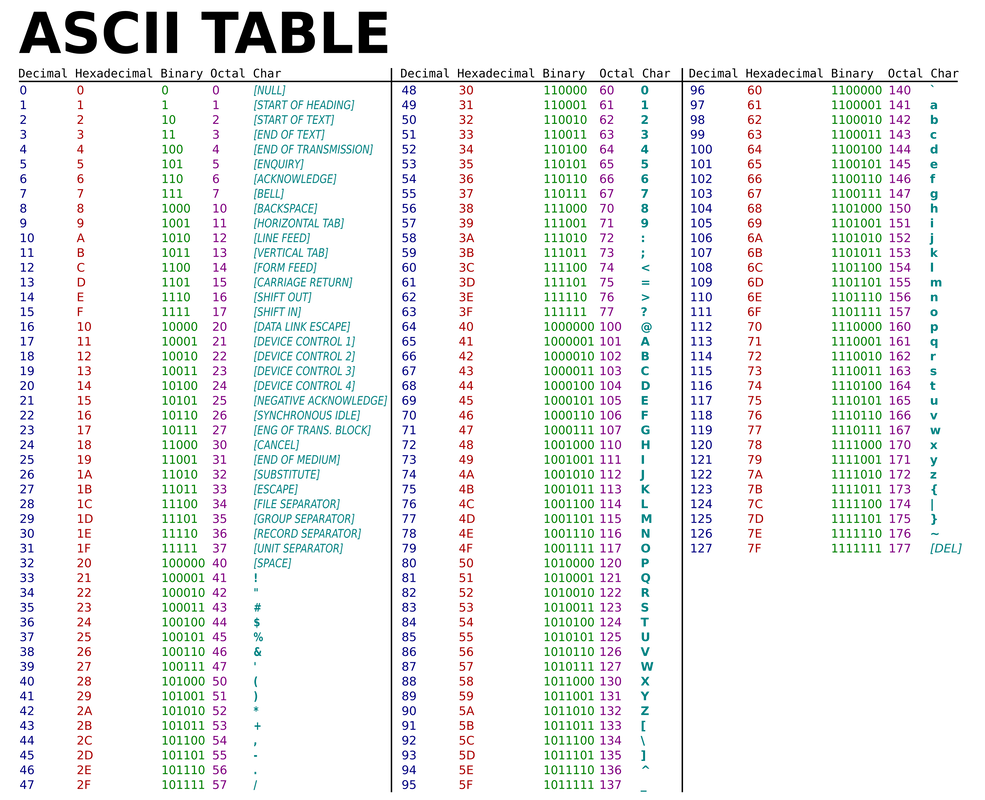American Standard Code for Information Interchange (ASCII)
What is ASCII?
Imagine a time way before McDonald's and KFC when computers were so rubbish, you couldn't use them to type in letters and numbers. Computers do not use or understand letters or denary numbers, computers only understand binary. ASCII is system used by computers that converts a binary number into a letter that appears on the screen of a computer when you press a letter on the keyboard. So because of the ASCII system, we can now use computers to type letters and numbers.
Here is the weird bit - there is not "U"
When you press the letter "U" on a normal computer keyboard, you are making a "circuit". Your big fat finger presses a plastic button (with a "U" printed on it) and the plastic button touches 2 pieces of metal together (inside the keyboard). This releases some binary numbers that move from the 2 pieces of metal, up the keyboard cable and into the computer. Inside the computer, the binary reaches the CPU and the CPU recognises the binary. The CPU then sends a signal and instruction to the graphics card (which is also inside the computer) and the graphics card sends a signal and instruction to the screen to "light up some teeny tiny squares" in the shape of a "U". Our eyes then see the teeny tiny squares that are in the shape of a "U" and believe that it is indeed a "U".
To see the teeny tiny squares, get out your smart phone (if you have one), turn on the camera, hold it close to this screen, point it at a letter on this screen and slowly zoom in and eventually, you will see the teeny tiny squares magnified. The squares are called pixels (they are made up of red, green and blue) and computer science people are always trying to make them smaller and smaller.
Below is a picture of the ASCII table.
Remember, when you press "a" on your keyboard, (according to the table below) 1100001 travels from the keyboard, to the CPU and then the screen. The final piece of the puzzle is that 1100001 is not a number but tiny burst of electricity, a bit like morse code.
Imagine a time way before McDonald's and KFC when computers were so rubbish, you couldn't use them to type in letters and numbers. Computers do not use or understand letters or denary numbers, computers only understand binary. ASCII is system used by computers that converts a binary number into a letter that appears on the screen of a computer when you press a letter on the keyboard. So because of the ASCII system, we can now use computers to type letters and numbers.
Here is the weird bit - there is not "U"
When you press the letter "U" on a normal computer keyboard, you are making a "circuit". Your big fat finger presses a plastic button (with a "U" printed on it) and the plastic button touches 2 pieces of metal together (inside the keyboard). This releases some binary numbers that move from the 2 pieces of metal, up the keyboard cable and into the computer. Inside the computer, the binary reaches the CPU and the CPU recognises the binary. The CPU then sends a signal and instruction to the graphics card (which is also inside the computer) and the graphics card sends a signal and instruction to the screen to "light up some teeny tiny squares" in the shape of a "U". Our eyes then see the teeny tiny squares that are in the shape of a "U" and believe that it is indeed a "U".
To see the teeny tiny squares, get out your smart phone (if you have one), turn on the camera, hold it close to this screen, point it at a letter on this screen and slowly zoom in and eventually, you will see the teeny tiny squares magnified. The squares are called pixels (they are made up of red, green and blue) and computer science people are always trying to make them smaller and smaller.
Below is a picture of the ASCII table.
Remember, when you press "a" on your keyboard, (according to the table below) 1100001 travels from the keyboard, to the CPU and then the screen. The final piece of the puzzle is that 1100001 is not a number but tiny burst of electricity, a bit like morse code.
Loading ASCII
